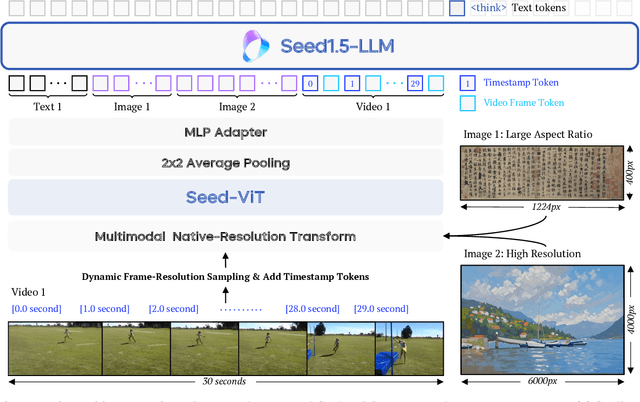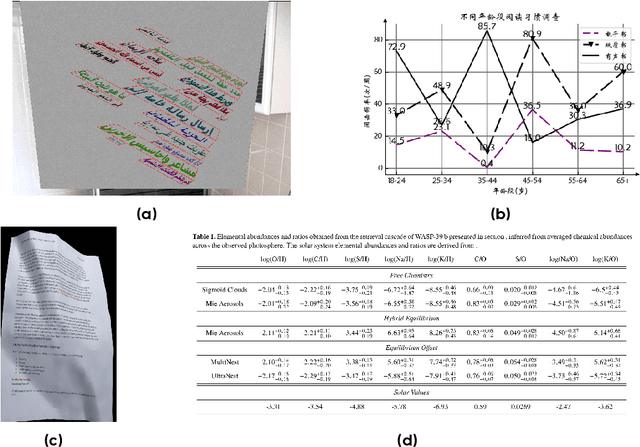Chaoyi Deng
Visual Generation Unlocks Human-Like Reasoning through Multimodal World Models
Jan 27, 2026Abstract:Humans construct internal world models and reason by manipulating the concepts within these models. Recent advances in AI, particularly chain-of-thought (CoT) reasoning, approximate such human cognitive abilities, where world models are believed to be embedded within large language models. Expert-level performance in formal and abstract domains such as mathematics and programming has been achieved in current systems by relying predominantly on verbal reasoning. However, they still lag far behind humans in domains like physical and spatial intelligence, which require richer representations and prior knowledge. The emergence of unified multimodal models (UMMs) capable of both verbal and visual generation has therefore sparked interest in more human-like reasoning grounded in complementary multimodal pathways, though their benefits remain unclear. From a world-model perspective, this paper presents the first principled study of when and how visual generation benefits reasoning. Our key position is the visual superiority hypothesis: for certain tasks--particularly those grounded in the physical world--visual generation more naturally serves as world models, whereas purely verbal world models encounter bottlenecks arising from representational limitations or insufficient prior knowledge. Theoretically, we formalize internal world modeling as a core component of CoT reasoning and analyze distinctions among different forms of world models. Empirically, we identify tasks that necessitate interleaved visual-verbal CoT reasoning, constructing a new evaluation suite, VisWorld-Eval. Controlled experiments on a state-of-the-art UMM show that interleaved CoT significantly outperforms purely verbal CoT on tasks that favor visual world modeling, but offers no clear advantage otherwise. Together, this work clarifies the potential of multimodal world modeling for more powerful, human-like multimodal AI.
Seed1.5-VL Technical Report
May 11, 2025



Abstract:We present Seed1.5-VL, a vision-language foundation model designed to advance general-purpose multimodal understanding and reasoning. Seed1.5-VL is composed with a 532M-parameter vision encoder and a Mixture-of-Experts (MoE) LLM of 20B active parameters. Despite its relatively compact architecture, it delivers strong performance across a wide spectrum of public VLM benchmarks and internal evaluation suites, achieving the state-of-the-art performance on 38 out of 60 public benchmarks. Moreover, in agent-centric tasks such as GUI control and gameplay, Seed1.5-VL outperforms leading multimodal systems, including OpenAI CUA and Claude 3.7. Beyond visual and video understanding, it also demonstrates strong reasoning abilities, making it particularly effective for multimodal reasoning challenges such as visual puzzles. We believe these capabilities will empower broader applications across diverse tasks. In this report, we mainly provide a comprehensive review of our experiences in building Seed1.5-VL across model design, data construction, and training at various stages, hoping that this report can inspire further research. Seed1.5-VL is now accessible at https://www.volcengine.com/ (Volcano Engine Model ID: doubao-1-5-thinking-vision-pro-250428)
Supercompiler Code Optimization with Zero-Shot Reinforcement Learning
Apr 24, 2024



Abstract:Effective code optimization in compilers plays a central role in computer and software engineering. While compilers can be made to automatically search the optimization space without the need for user interventions, this is not a standard practice since the search is slow and cumbersome. Here we present CodeZero, an artificial intelligence agent trained extensively on large data to produce effective optimization strategies instantly for each program in a single trial of the agent. To overcome the huge range of possible test programs, we prepare a large dataset of training programs that emphasize quality, naturalness, and diversity. To tackle the vast space of possible optimizations, we adapt deep reinforcement learning to train the agent in a sample-efficient manner through interacting with a world model of the compiler environment. Evaluation on both benchmark suites and production-level code optimization problems demonstrates our agent's supercompiler performances and zero-shot generalization abilities, outperforming built-in optimization options designed by compiler experts. Our methodology kindles the great potential of artificial intelligence for engineering and paves the way for scaling machine learning techniques in the realm of code optimization.
Pre-training Contextualized World Models with In-the-wild Videos for Reinforcement Learning
May 29, 2023Abstract:Unsupervised pre-training methods utilizing large and diverse datasets have achieved tremendous success across a range of domains. Recent work has investigated such unsupervised pre-training methods for model-based reinforcement learning (MBRL) but is limited to domain-specific or simulated data. In this paper, we study the problem of pre-training world models with abundant in-the-wild videos for efficient learning of downstream visual control tasks. However, in-the-wild videos are complicated with various contextual factors, such as intricate backgrounds and textured appearance, which precludes a world model from extracting shared world knowledge to generalize better. To tackle this issue, we introduce Contextualized World Models (ContextWM) that explicitly model both the context and dynamics to overcome the complexity and diversity of in-the-wild videos and facilitate knowledge transfer between distinct scenes. Specifically, a contextualized extension of the latent dynamics model is elaborately realized by incorporating a context encoder to retain contextual information and empower the image decoder, which allows the latent dynamics model to concentrate on essential temporal variations. Our experiments show that in-the-wild video pre-training equipped with ContextWM can significantly improve the sample-efficiency of MBRL in various domains, including robotic manipulation, locomotion, and autonomous driving.
 Add to Chrome
Add to Chrome Add to Firefox
Add to Firefox Add to Edge
Add to Edge